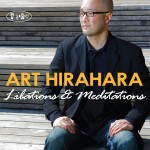Pianist Art Hirahara’s latest release on the Posi-Tone label is, as the title implies, music to drink in and think in. It’s a collection of aural offerings tied to Hirahara’s experiences coping with the loss of his father, but it’s not a somber program. In fact, quite the opposite. The first three numbers—a brief, up-tempo display of pianistic agility (“With Two Ice Cubes”), a piece born with pulsation that travels to a joyous space (“Father’s Song”), and a number that highlights the grooving interplay between Hirahara, bassist Linda Oh, and drummer John Davis (“Be Bim Bop”)—make it clear that Hirahara is celebrating life, not dwelling on loss.
As the program continues, Hirahara and his trio mates continue to work with good cheer. “D.A.Y.” opens with a swampy groove from Davis and a hint of mystery in Hirahara’s fingers, but it’s off to the races when Davis and Oh open up their stride and let the swing feel take hold. Davis proves to be the star on this piece, stealing the show when he solos and steering the band back into line. Bill Evans‘ “Only Child” proves to be another winner. It’s a fine example of tripartite synergy, highlighting the connections between Oh’s springy bass, Davis’ brush work, independence, and stick-on-ride play, and Hirahara’s firm pianistic direction(s).
Those waiting for overly reflective moments will find few on this album. In fact, “Dead Man Posed,” a number that delivers peace and tranquility in swelling and receding fashion, is it. The album-ending “Nereids And Naiads” is a ruminative and soul-searching number in five that builds into something bolder; “Big Country” develops with thoughtfulness and optimism, though it’s hardly calm; and “The Looking Glass” leaves Hirahara to work out his thoughts, which are not sentimental, by himself. The message in the music seems to be that we all need to eventually look beyond the grief and pain. Loved ones are never really gone, as those that remain continue to carry them forward through stories, deeds, memories, and, in this case, music.

